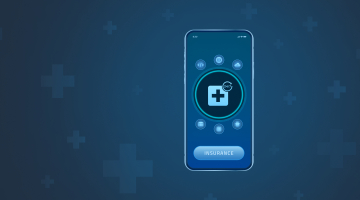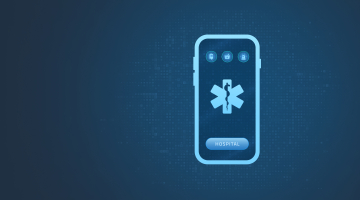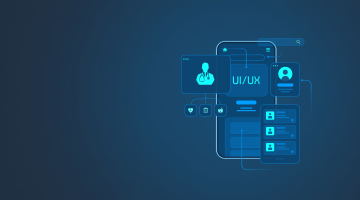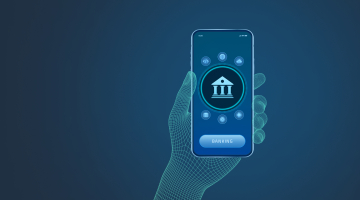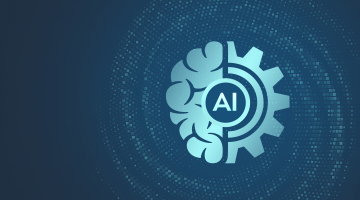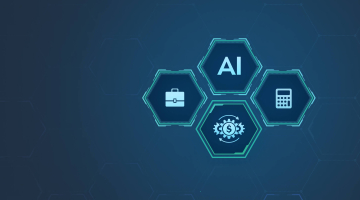

Healthcare chatbots: Key benefits and features
Artificial intelligence, natural language processing (NLP), neuro-symbolic AI, and other groundbreaking innovations are revolutionizing multiple industries today. The medical field is no exception. These novel technologies penetrate various areas of the healthcare system and find ready applications in hospitals, research labs, nursing homes, pharmacies, and doctor practices. When they become the staple of the tech stack leveraged in creating various software solutions, these cutting-edge tools transform into state-of-the-art products capable of solving the most complex problems.
AI-powered conversational chatbots are typical examples of products that disrupt the contemporary healthcare industry and act as an essential element of the comprehensive digitalization drive.
Digital transformation in healthcare: Discovering the reasons
Like any other business sphere, healthcare aims to provide maximum satisfaction to its customers. Yet, modern clients are hard to please. They clamor for the top-quality services they want to obtain at their convenience. To meet their patients halfway, medical facilities have no choice but to embrace the digital transformation of their pipeline activities on a broad scale. Once properly implemented, this changeover enables them to boost workflows, enhance productivity, process huge amounts of data, improve customer service, automate a fair share of their shop floor operations, and reduce manual labor. All these perks translate into curtailed expenditures and increased agility, helping them stay competitive in the niche.
Alongside telemedicine and mhealth solutions, chatbot technology in healthcare is a primary digitalization driver. What advantages does healthcare chatbot development bring to stakeholders in the sector?
Benefits of chatbots in healthcare scrutinized
As a seasoned healthcare chatbot development company, DICEUS considers the following assets of AI chatbots in healthcare the weightiest ones:
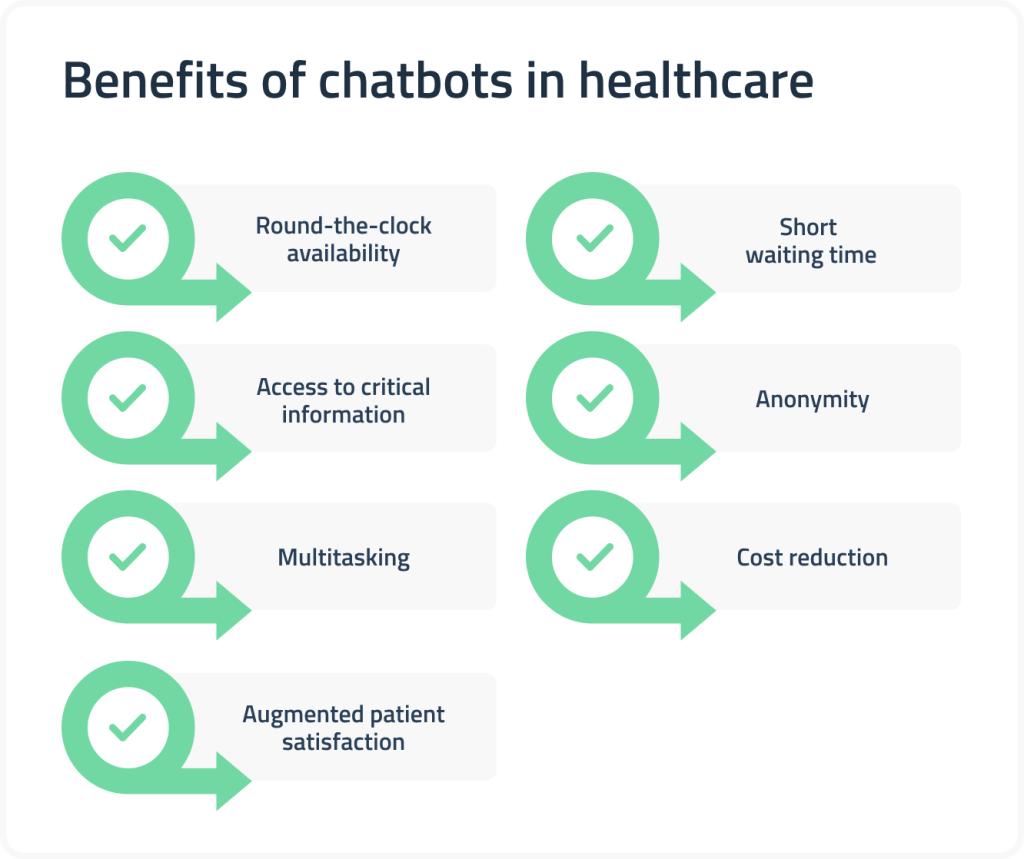
- Round-the-clock availability. Unlike human personnel, a virtual assistant isn’t limited in its functionality by business hours. Customers can address chatbots at any time and receive assistance immediately.
- Short waiting time. Machines react to queries much faster than humans. Also, chatbots in healthcare can be configured to recognize emergency cases and act promptly in such situations, explaining what a person should do or what can happen to them in certain conditions.
- Access to critical information. Chatbots can serve as a source of reference data concerning nearby pharmacies and medical facilities, their operating hours, and the like to provide foolproof navigation for patients and let them find the best option.
- Anonymity. The medical sector deals with sensitive data many patients prefer to keep private. The use of chatbots in healthcare allows people to feel more comfortable when sharing information related to mental state, sexual abuse, sexually transmitted disease tests, etc.
- Multitasking. Chatbots have an edge over human specialists since they can engage several patients simultaneously, thus serving more people who need help.
- Cost reduction. Medicare facilities can save a pretty penny on support personnel’s salary, their workstation and infrastructure maintenance, and other operational expenditures by delegating their responsibilities to a self-service chatbot for healthcare purposes.
- Augmented patient satisfaction. If a chatbot is sophisticated and usable, it will be able to understand people’s individual needs, offer relevant information, and provide timely assistance. As a result, their satisfaction with medical services will soar.
That sounds impressive, doesn’t it? Then, learn about the possible healthcare applications of this technology.
Zooming in on chatbot use cases in healthcare
DICEUS has specialized in delivering high-end healthcare software for over 13 years, so our specialists have an in-depth knowledge of the industry and can pinpoint various chatbot applications.
Appointment scheduling
With a chatbot in place, you will forget about constantly ringing phones in your hospital and people’s complaints that your lines are always busy. Using this technology, patients can send an appointment request to your clinic and book it hassle-free. They can also cancel or reschedule the appointment if they can’t make it on time.
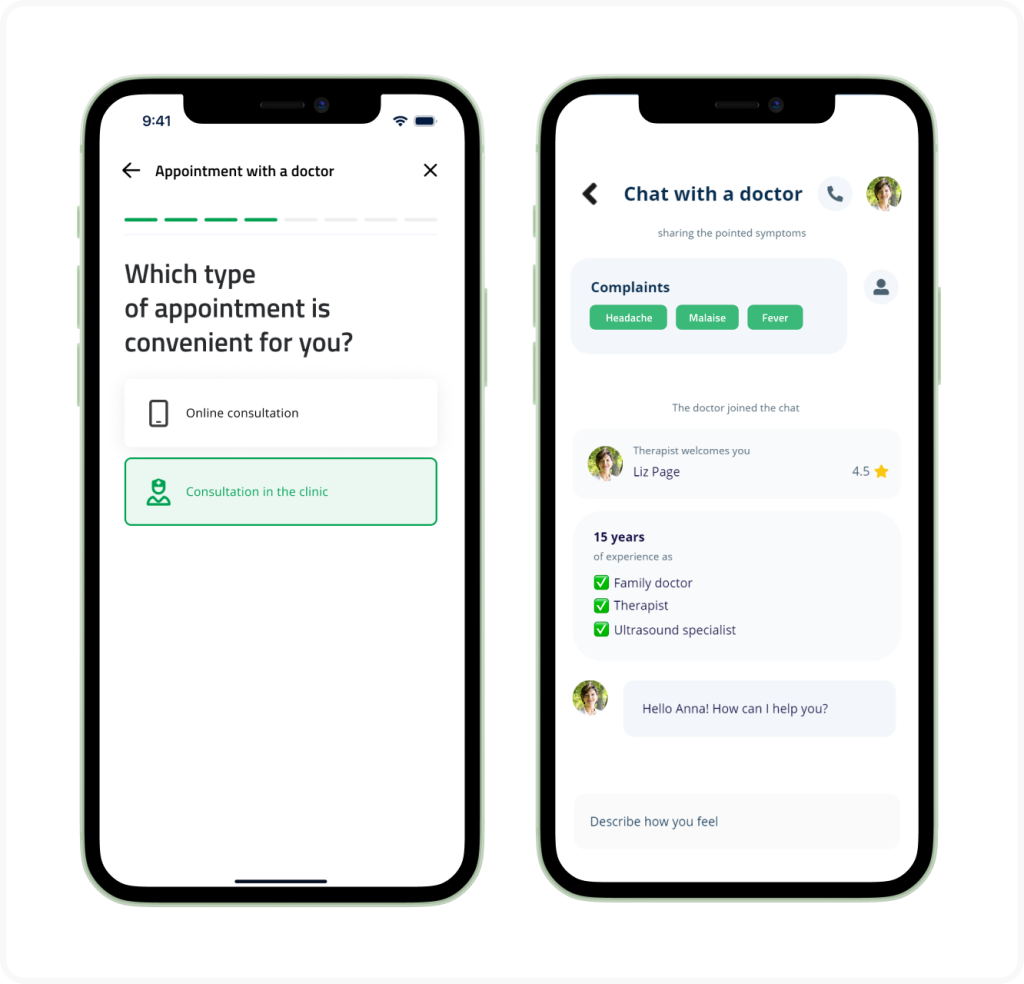
Assessing symptoms
This function is especially useful for bedridden people. A person can characterize their state, after which the machine will suggest a way of treatment or schedule an appointment with a relevant specialist. If the patient has problems describing their condition, the chatbot can ask some prompting or suggestive questions and clarify details.
Patient onboarding automation
It is not only about live answering FAQs concerning your hospital’s onboarding procedure and guiding patients through this routine. Chatbots can also send people educational videos and tutorials on this topic, which they will watch at their convenience.
Diagnostic appointment support
Testing or diagnostic procedures often require special preparation in advance. An AI-fueled chatbot will remind the patient to meet particular pre-testing conditions (for instance, fasting or drinking large amounts of water), answer their questions on the topic, and send any visual material to help the person understand the future manipulation.
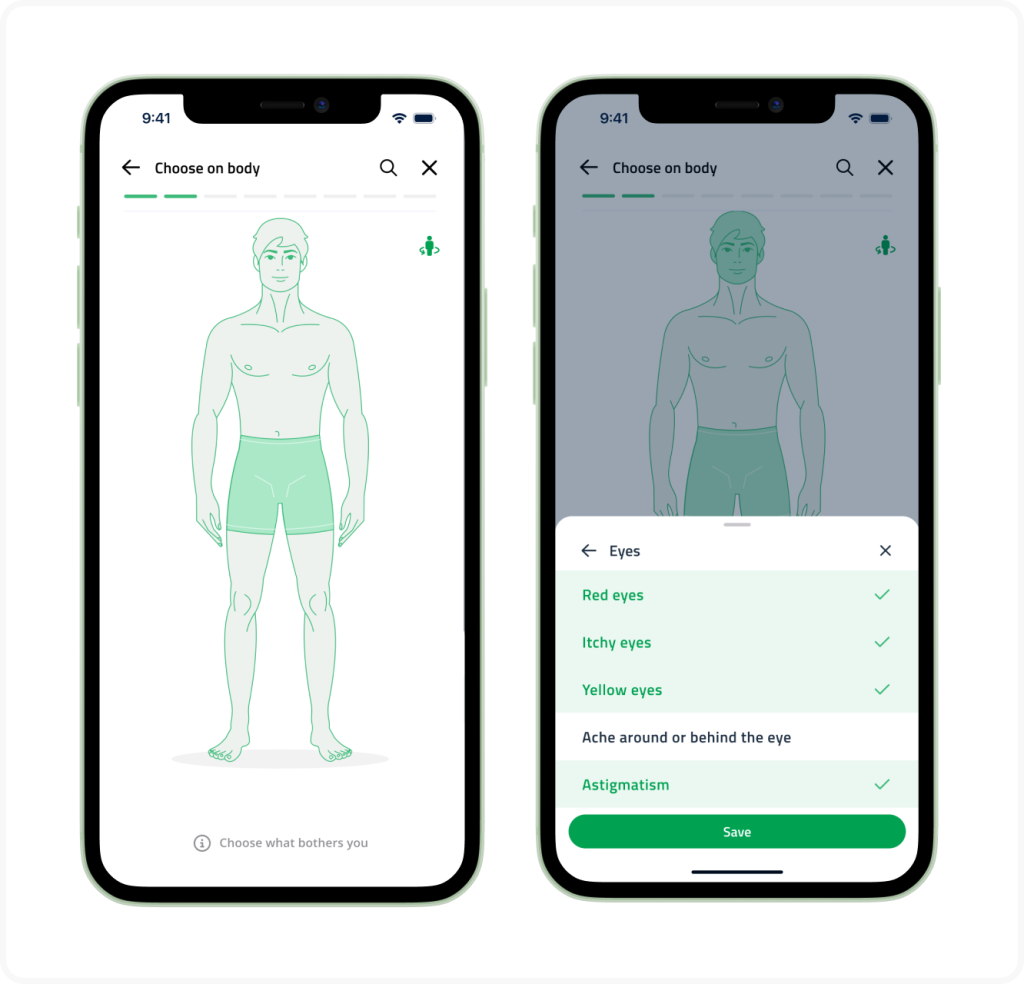
After-diagnostic education
With the diagnosis on their hands, patients often surf the Internet to get advice. Instead of spending hours and comparing controversial recommendations (whose competence level is highly dubious), they can address a chatbot that is specifically honed to answer such queries. The machine will provide various educational content, professional tips, and qualified remedies to let people learn more about their problems and the ways to handle them.
Disease management flows
Healthcare facilities shouldn’t leave their customers adrift in the process of treatment. Doctors can improve their illness management by creating message flows for patients to let them keep to a certain diet or do exercises prescribed by the physician.
Administering disease prevention campaigns
Prevention is the best treatment. You can bring this universal truth home to people by raising their awareness of the causes of different disorders. Chatbots can be programmed to address relevant audiences that should be encouraged to be proactive in avoiding heart attacks, strokes, or even simple colds and flu during certain seasons. Also, women can be informed about how to check for breast lumps or take care of their reproductive health.
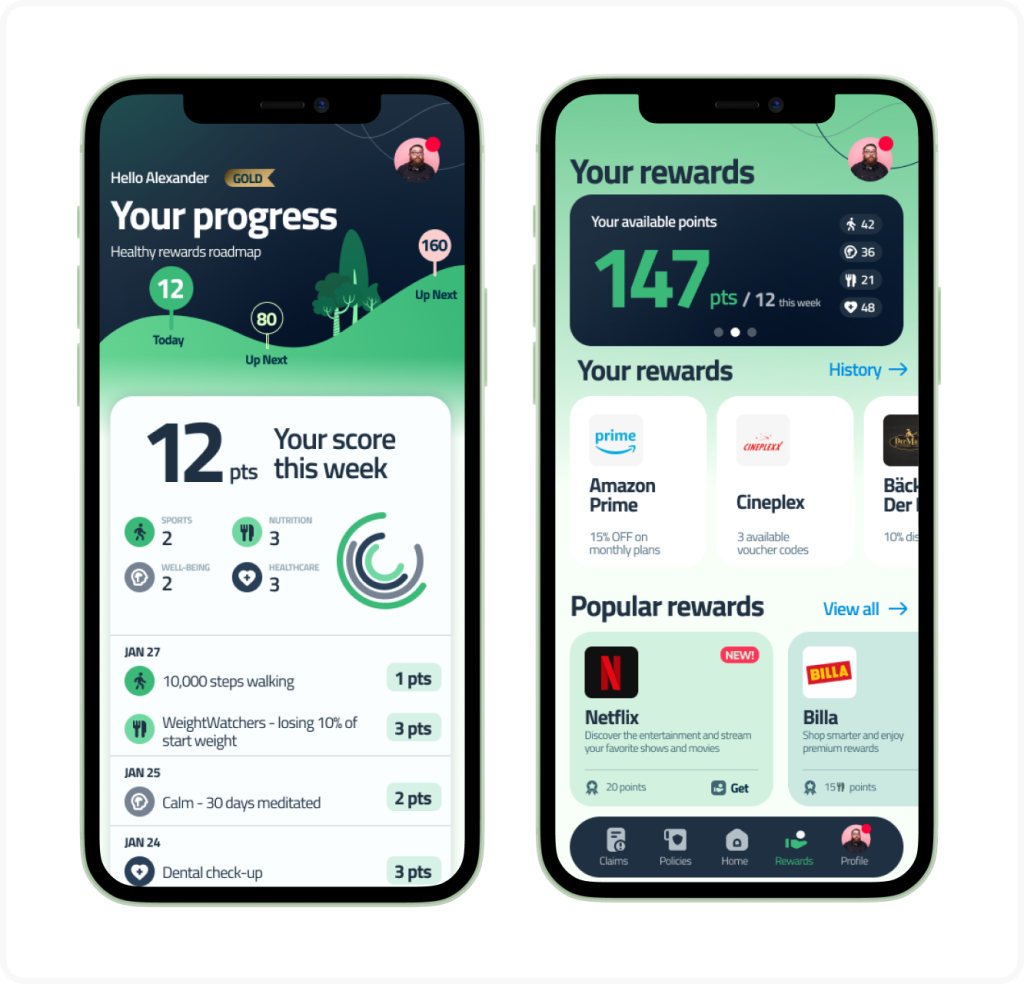
Streamlining search for nearby facilities
Trained to learn about people’s particular needs, chatbots can direct them to the nearest pharmacy, clinic, or healthcare center. They can also inform people about their list of services, the roster of specialists, and the availability of medicines, as well as provide contact information and user reviews.
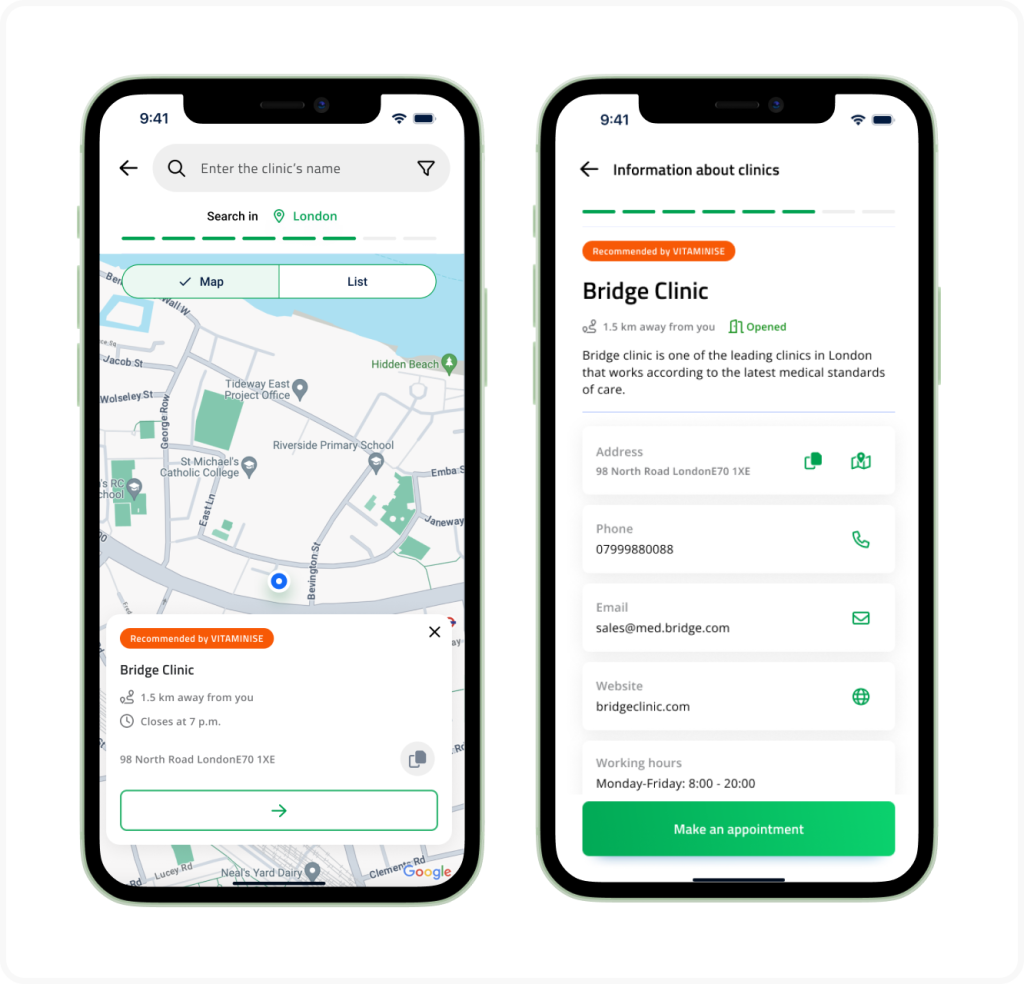
Connecting a person with a clinician
When you know which specialist can solve your problem, the chatbot will schedule and set up a video or voice call with the doctor, who will leverage the power of telemedicine software to provide consultation and help to the chatbot user.
Sending reminders
Sometimes, human memory isn’t that retentive, especially when it comes to sick people. Chatbots can become a good crutch in this problem by reminding them about important events and manipulations, for instance, taking medications, refilling prescriptions, completing abandoned intake or pre-appointment forms on the site, staying up-to-date with vaccinations, and more. Besides, chatbots can answer related questions concerning drug dosage or side effects the medicine may have.
Sending informal messages
Enabling the chatbot to send messages other than dry reminders can add a tinge of human touch to your interactions with customers. Event invitations, welcome messages, and birthday congratulations will let people feel valued and important clients of your healthcare facility.
Requesting medical data
Sometimes, we need to check our case history or clinical test results right now. Chatbots can to provide access to people’s medical dossiers by integrating them with EHR and EMR software.
Learn more about the power of healthcare data with our services
Collecting patient feedback
Any high-profile healthcare facility always works to enhance the level of its services. Customer feedback is a second-to-none source of information on patient satisfaction and complaints they have. It can be used as actionable insights for data-driven strategic decisions. The routine of collecting feedback can be delegated to a conversational chatbot that will listen to everything people have to tell about your organization.
Mental health assistance
Mental health is one of the top concerns in our hectic and resource-draining age. During an acute psychological crisis, people need urgent help, which can be hard to find in remote areas or beyond a specialist’s working hours. Healthcare chatbots are called to step into the breach and provide self-help tips (meditation, positive affirmations, relaxation exercises, and the like), let people speak with other individuals experiencing similar problems for peer support, and connect them with mental health experts for professional assistance.
Handling insurance claims
Dealing with red tape is always a stressful ordeal, especially for ill people. You can set up your chatbot to streamline and facilitate health insurance claims management. It will not only answer all their questions concerning their insurance plan, coverage, and available medical services but also guide people step-by-step through the entire process – from submitting a claim to receiving a disbursement.
Given such a multitude of use cases, it’s no wonder that the future of chatbots in healthcare looks extremely bright. Whereas the healthcare chatbot market size was under $195 million only three years ago, it is expected to top $943 million by 2030, manifesting a tremendous CAGR of 19.16%. Such numbers are the best proof that the application of this technology in healthcare is experiencing a sharp spike.
If you want to keep abreast of the current trends in the industry, you should launch your chatbot as soon as possible. With our first-rate qualification in AI software development and broad awareness of the healthcare industry specifics, DICEUS is the best option for hiring as a chatbot development IT vendor. Contact us to obtain the best-in-class solution that will drastically enhance the customer experience of your patients and boost your pipeline routine.
Estimate project costs
Please share more details of your project with our team.

Drawing a bottom line
In the conditions of across-the-board digitalization penetrating an ever-growing range of industries, healthcare facilities employ various state-of-the-art tools to take their services to a new level. AI- and NLP-powered conversational chatbots are quickly becoming a vital element of the professional IT ecosystem of medicare organizations. They present a 24/7 customer support channel that can provide prompt advice and assistance to consumers of healthcare services. Chatbots solve a multitude of tasks concerning the healthcare pipeline – from symptom assessment, appointment management, and patient onboarding to disease management, medical data access, and collecting customer feedback.
You can maximize the contribution of healthcare chatbots to your organization’s workflow by entrusting their development to qualified and certified IT specialists with top-notch expertise in the niche.
FAQ
Why are chatbots important in healthcare?
Together with other high-tech advancements, chatbots have become a pivotal component of the contemporary digitalization drive dominating the healthcare industry. These AI-powered tools rely on cutting-edge technologies to ease the burden on medical organizations’ customer support teams and increase the level of services they provide to patients.
How do chatbots work in healthcare?
Chatbots are integrated into a professional solution launched by a medical facility as a 24/7 available tool for customer support in the healthcare field. Relying on AI, ML, and NLP, chatbots can analyze human speech, understand the message’s intent, and search its pre-programmed response database for a relevant answer, thus providing advice and assistance to consumers of healthcare services.
What are the benefits of using chatbots in healthcare?
Chatbots provide a cost-effective 24/7 communication channel with medical services consumers who can immediately and anonymously get an answer to their question, receive qualified advice, access critical information, and obtain the necessary assistance without engaging human personnel of a medical facility.
What tasks can chatbots perform in healthcare settings?
The list of such tasks is virtually unlimited. Chatbots are highly instrumental in patient onboarding, appointment and disease management, symptom assessment, search for nearby healthcare facilities, sending various reminders, accessing medical data, collecting patient feedback, launching disease prevention campaigns, handling insurance claims, etc.
Can chatbots offer personalized medical advice to patients?
This is what healthcare chatbots are essentially for. Being configured to engage in human-like communication, these smart machines can listen to individual complaints or queries, offer personal recommendations, remind of vital for certain patient procedures and events, assess their state, connect them to the relevant clinician, enable access to their EHR, and more.
